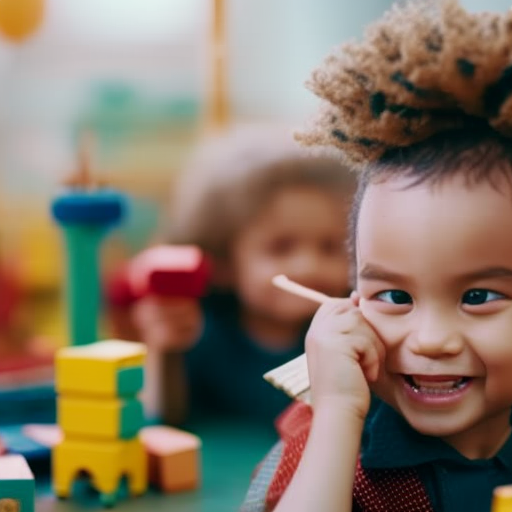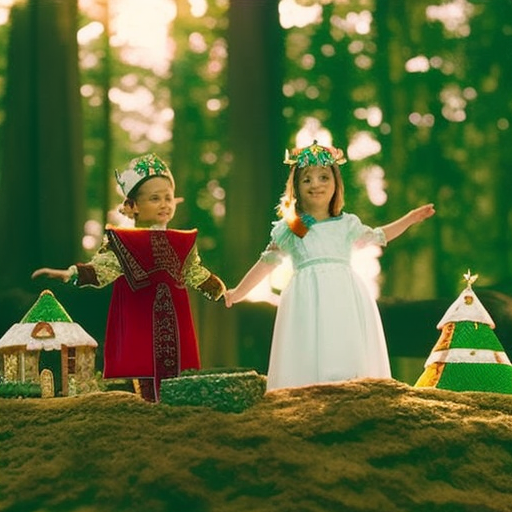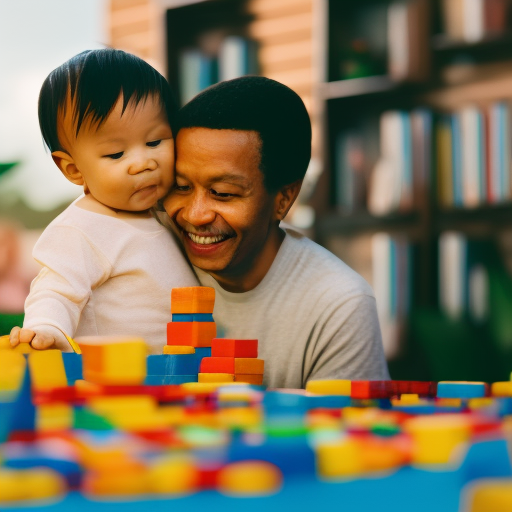"Cherishing Little Steps - A Haven for Baby and Family Journeys"
Creative Play for Early Development
Hey there! Did you know that creative play is like a magical potion for your little one’s early development? It’s true!
When children engage in imaginative play, they embark on a journey of growth and discovery. Through activities like building forts, pretending to be superheroes, or creating masterpieces with crayons, they are not only having a blast but also developing essential skills.
Creative play encourages imaginative thinking, boosts problem-solving abilities, and nurtures social and emotional skills. Plus, it’s a whole lot of fun!
So, whether it’s a tea party in the backyard or a make-believe adventure in the living room, make sure to carve out some time for creative play. Your little one will thank you for it!
Key Takeaways
- Creative play nurtures imagination and creativity.
- It supports problem-solving skills and develops cognitive abilities.
- Creative play enhances social skills and promotes emotional well-being.
- It improves cognitive abilities, fosters self-expression, and boosts confidence and self-esteem.
The Importance of Creative Play
Discover the crucial role that creative play plays in your child’s early development. Creative play isn’t just about having fun; it’s an essential part of nurturing your child’s imagination and fostering their creativity. Through creative play, children have the opportunity to explore their world, express themselves, and develop their problem-solving skills.
One important aspect of creative play is the role of art. When children engage in activities such as painting, drawing, or sculpting, they aren’t only creating something visually appealing but also developing their fine motor skills. Art allows them to experiment with colors, shapes, and textures, stimulating their senses and encouraging self-expression.
Incorporating creative play into your child’s daily routine can have numerous benefits. It helps them develop their cognitive abilities, such as critical thinking and decision-making. It also enhances their social skills as they learn to collaborate and communicate with others during playtime. Moreover, creative play promotes emotional well-being by providing an outlet for self-expression and imagination.
Benefits of Creative Play for Development

Engaging in creative play regularly can have numerous benefits for your child’s development. Here are four ways in which creative play can positively impact your child’s growth:
-
Improving cognitive abilities: Through creative play, children engage in problem-solving, critical thinking, and decision-making. Whether they’re building with blocks, solving puzzles, or creating imaginary worlds, their cognitive abilities are stimulated and strengthened.
-
Fostering self-expression: Creative play provides children with a safe space to express themselves freely. Whether it’s through art, music, or pretend play, they can explore their emotions, ideas, and identity. This self-expression helps to build confidence and develop their sense of self.
-
Enhancing social skills: Engaging in creative play with others encourages collaboration, communication, and empathy. Children learn to share, take turns, and negotiate roles, fostering important social skills that will benefit them throughout their lives.
-
Promoting imagination and creativity: Creative play allows children to tap into their imagination and unleash their creativity. By pretending to be different characters, inventing stories, or experimenting with different materials, they develop their imaginative thinking and problem-solving skills.
So, by encouraging and supporting your child’s creative play, you’re providing them with a platform for improving cognitive abilities, fostering self-expression, enhancing social skills, and promoting imagination and creativity.
Let their imagination soar and watch them thrive!
Promoting Imaginative Thinking Through Play

Unleash your child’s imagination through play. Stimulating creativity and encouraging open-ended play are essential for promoting imaginative thinking in early development. When children engage in creative play, they’ve the opportunity to explore new ideas, think outside the box, and solve problems in unique ways.
By providing your child with materials that can be used in multiple ways, such as blocks, art supplies, and dress-up clothes, you’re encouraging open-ended play. This type of play allows children to use their imagination freely, without any specific rules or limitations. They can build elaborate structures, create fantastical stories, or transform into different characters, all while honing their imaginative thinking skills.
Creative play also helps children develop their communication and social skills. When engaging in imaginative play with others, they learn to collaborate, negotiate, and take on different roles. They learn to express their thoughts and ideas, listen to others, and work together to create shared experiences.
Incorporating creative play into your child’s daily routine can be as simple as setting aside dedicated playtime, providing a variety of open-ended toys and materials, and joining in their play. By doing so, you aren’t only stimulating their creativity and promoting imaginative thinking, but also fostering a deeper bond and connection with your child.
Enhancing Problem-Solving Skills Through Play

To enhance problem-solving skills through play, you can encourage your child to explore creative solutions and think critically. Here are four ways to foster their problem-solving abilities and nurture their critical thinking skills:
-
Encourage open-ended play: Provide your child with toys and materials that allow for open-ended exploration and problem-solving. Building blocks, puzzles, and art supplies are great options. This type of play encourages your child to think creatively and find innovative solutions to challenges.
-
Pose thought-provoking questions: Engage your child in conversations that require them to think critically. Ask questions like, ‘What do you think will happen if we try this?’ or ‘How could we solve this problem differently?’ This helps your child develop the ability to analyze situations and come up with logical solutions.
-
Provide opportunities for decision-making: Allow your child to make choices and decisions during playtime. This could be as simple as letting them choose which game to play or as complex as involving them in problem-solving activities that require them to weigh options and consider consequences. Decision-making helps develop problem-solving techniques and builds confidence in their abilities.
-
Encourage collaboration: Engage your child in cooperative play with others. This helps them learn how to work together, listen to different perspectives, and find solutions that satisfy everyone. Collaborative play fosters critical thinking skills by requiring your child to consider multiple viewpoints and find compromises.
Developing Social and Emotional Skills Through Play
Develop social and emotional skills through play by fostering empathy and emotional awareness. Play provides a safe space for children to explore and understand their own emotions, as well as those of others. Through imaginative play, children have the opportunity to step into different roles and perspectives, allowing them to develop empathy and compassion. They can pretend to be a doctor caring for a sick teddy bear or a superhero saving the day, which helps them understand how others might feel in different situations.
Building self-confidence is another important aspect of developing social and emotional skills through play. When children engage in play, they’re given the freedom to make decisions, solve problems, and take risks. This boosts their self-esteem and helps them learn to trust their own abilities. Whether it’s building a tower with blocks or creating a masterpiece with art supplies, each accomplishment contributes to their sense of self-worth.
Play also provides opportunities for children to practice social skills such as turn-taking, sharing, and cooperation. Whether they’re playing a board game or participating in a pretend tea party, children learn to navigate social interactions and develop important skills needed for successful relationships.
Fun and Engaging Activities for Creative Play
Get ready to explore a variety of fun and engaging activities that will spark your child’s creativity during playtime. Let their imagination soar with these interactive art and sensory exploration ideas:
-
Finger Painting Fiesta: Set up a painting station with non-toxic, washable paints and large sheets of paper. Encourage your child to dip their fingers into the paint and create colorful masterpieces using their hands as brushes. This tactile experience not only stimulates their senses but also allows them to express themselves through art.
-
Nature Collage Adventure: Take a nature walk with your child and collect various natural materials like leaves, flowers, and twigs. Back at home, provide them with a blank canvas or cardstock and glue. Watch as they arrange and glue the different elements to create a unique and textured collage inspired by the beauty of the outdoors.
-
Sensory Playdough Fun: Make homemade playdough and add different scents, colors, and textures to enhance the sensory experience. Let your child mold and shape the playdough into their own creations, promoting fine motor skills and creativity.
-
Storytelling Puppet Show: Gather some old socks, markers, and craft supplies to create colorful sock puppets. Help your child come up with a story and encourage them to act it out using their puppets. This interactive play activity not only fosters creativity but also enhances language development and storytelling skills.
Engaging in these interactive art and sensory exploration activities won’t only provide hours of fun but also stimulate your child’s creativity and imagination. So, get ready to dive into a world of endless possibilities!
Strategies to Support Early Development Through Play

Support your child’s early development through play with these effective strategies.
Play isn’t just a way for children to have fun, but it also plays a crucial role in their overall development. By incorporating specific strategies into their playtime, you can enhance their learning and growth.
One strategy is to provide open-ended materials and toys, such as blocks or art supplies, that encourage creativity and problem-solving. These types of play allow children to use their imagination and explore different possibilities.
Another strategy is to engage in pretend play, which helps develop their social and emotional skills. Encourage them to take on different roles and act out different scenarios, fostering their communication and empathy.
Furthermore, engaging in physical play, such as outdoor activities or sports, promotes their gross motor skills and overall physical development. It’s important to provide a safe space for them to explore, climb, run, and jump.
Additionally, incorporating structured play activities, like puzzles or board games, helps develop their cognitive skills, including critical thinking and problem-solving.
Frequently Asked Questions
How Does Creative Play Contribute to a Child’s Physical Development?
Playing creatively helps develop your physical coordination and gross motor skills. It allows you to move and explore in ways that challenge your body, making you stronger and more agile. So go ahead, let your imagination run wild and have fun!
Can Creative Play Aid in Improving a Child’s Language and Communication Skills?
Playing creatively can greatly enhance your child’s language and communication skills. Through imaginative play, they learn to express themselves, use words in different contexts, and engage in conversations, improving their social skills and problem-solving abilities.
Is It Possible for Creative Play to Enhance a Child’s Cognitive Abilities?
Engaging in creative play can enhance your cognitive abilities by stimulating problem solving and critical thinking. Through imaginative play, you’ll develop a creative mindset that encourages innovative solutions and expands your mental capabilities.
How Does Creative Play Support a Child’s Self-Expression and Self-Confidence?
Artistic exploration through creative play allows you to freely express yourself, boosting self-confidence. Imagination benefits you by fostering a sense of autonomy and the ability to think outside the box, enhancing self-expression.
Can Creative Play Help Children Develop Empathy and Understanding Towards Others?
Creative play can definitely help you develop empathy and understanding towards others. Through engaging in empathy building activities and fostering understanding through play, you’ll learn to see the world from different perspectives and connect with others on a deeper level.
Conclusion
Congratulations! You’ve now unlocked the secret to early development through creative play. By embracing the power of imaginative thinking, problem-solving, and social and emotional skills, you’re setting the stage for your child’s future success.
So go ahead, dive into the world of fun and engaging activities that promote creative play. Remember, play isn’t just child’s play, it’s the catalyst for a brilliant future!
Embrace it, enjoy it, and watch your little one thrive.



Undoubtedly, there is a great deal to learn on this topic. I agree with everything you said. It was all very nicely said. I loved every quote, and I appreciate you sharing the information. Continue inspiring and sharing with others.